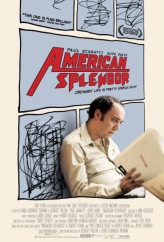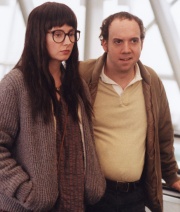|
American Splendor
|
| |
 |
USA, 2003. Rated R. 101 minutes.
Cast:
Paul Giamatti, Hope Davis, Judah Friedlander, James Urbaniak, Madylin
Sweeten, Harvey Pekar, Joyce Brabner, Toby Radloff
Writers: Shari Springer Berman & Robert Pulcini, based on the comic
book series American Splendor by Harvey Pekar, and on the comic
book series Our Cancer Year by Joyce Brabner
Original Music: Mark Suozzo, Eytan Mirsky (title song)
Cinematography: Terry Stacey
Producer: Ted Hope
Directors: Shari Springer Berman, Robert Pulcini
LINKS
|
Read the AboutFilm
feature profile and interview with Paul Giamatti.
 ostmodernism.
ostmodernism.
People like to throw the term around without knowing what it actually
means—so many people, in fact, that it has become a bit of a joke, as evidenced
by the existence of "The
Postmodernism Generator," a site that generates pompous essays that are
entirely meaningless.
The term does mean something, though. Postmodernism is an artistic movement
or trend that embraces ambiguity and fragmentation while rejecting genre distinctions.
Postmodernist art is ironically self-aware, admitting to its own subjectivity
and manipulation, acknowledging that there is man behind the curtain. It deconstructs
the iconography and classic storytelling of the past, offers trivia and chaos
in their stead as a response to a chaotic world that renders individuals and
art increasingly trivial. Postmodern films include Spike Jonze's Adaptation,
Steven Soderbergh's Full Frontal, Stephen Frears' High Fidelity,
Michael Winterbottom's 24 Hour Party People, and pretty much anything
by Quentin Tarantino, to name but a few. And American Splendor. Movies
don't get any more deconstructed and self-referential than this.
How even to describe American Splendor? If Seinfeld was a television
show about nothing, then American Splendor is a movie based on a comic
book about nothing. American Splendor the comic book consists of the
observations of Harvey Pekar, an angry, often disagreeable cynic who works as
a file clerk at a Cleveland V.A. hospital. His motto (and the tagline of the
film): "Ordinary life is pretty complex stuff."
The movie portrays Pekar (Paul Giamatti) as an obsessive-compulsive grouch
abandoned by his wife and stuck in a dead-end life. An avid collector of just
about anything, including comic books, Pekar meets local boy Robert Crumb (James
Urbaniak) at a junk sale. Crumb eventually becomes a renowned underground comic
book author (as well as the subject of Terry Zwigoff's acclaimed documentary
Crumb), and  his
success inspires Pekar to make his mark on the world, or at least to leave something
behind. In the Seventies, he begins to write unsentimental, harshly truthful
comic books about his own life, which are then illustrated by Crumb and others,
because Pekar can't even draw a straight line. The comic books depict everyday
events, Pekar's advice on such things as how to select the fastest line at the
grocery store, and his oddball friends, including self-proclaimed, quintessential
nerd Toby (Judah Friedlander). Remarkably, the books are an underground hit,
bringing him notoriety, appearances on David Letterman, stage adaptations, and
the interest of his future wife Joyce Brabner (the wonderful Hope Davis, never
afraid to get frumpy), who has an equally sardonic and matter-of-fact take on
the world. The books do not, however, bring him much money—and still haven't,
according to Pekar.
his
success inspires Pekar to make his mark on the world, or at least to leave something
behind. In the Seventies, he begins to write unsentimental, harshly truthful
comic books about his own life, which are then illustrated by Crumb and others,
because Pekar can't even draw a straight line. The comic books depict everyday
events, Pekar's advice on such things as how to select the fastest line at the
grocery store, and his oddball friends, including self-proclaimed, quintessential
nerd Toby (Judah Friedlander). Remarkably, the books are an underground hit,
bringing him notoriety, appearances on David Letterman, stage adaptations, and
the interest of his future wife Joyce Brabner (the wonderful Hope Davis, never
afraid to get frumpy), who has an equally sardonic and matter-of-fact take on
the world. The books do not, however, bring him much money—and still haven't,
according to Pekar.
Pekar's a pretty postmodern guy, but that's not all that makes American
Splendor postmodern. Drawing on their background as documentarians and inspired
by such films as Crumb and 24-Hour Party People, writer/directors Shari
Springer Berman and Robert Pulcini have created a remarkable amalgamation of
the real and the fictionalized. American Splendor doesn't just have character-actor-extraordinaire
Paul Giamatti embodying an uncanny recreation of Harvey Pekar; it has the real
Harvey Pekar narrating and interpolating, including comments on the cinematic
adaptation itself. The real Joyce and others also appear. With one exception,
the David Letterman appearances aren't restaged—the actual footage is used,
merged into the film. Comic book-style panels and captions provide the film's
transitions, and sometimes Pekar appears as an animated character.
The continual shifts between real and fake sounds jarring, but it isn't. Rather,
it makes perfect sense. It's a tremendously postmodern adaptation of tremendously
postmodern work. Pulcini handled editing duties, and has skillfully cut the
film in a way that holds together thematically. In a recent interview with AboutFilm,
Berman and Pulcini characterized their movie as the opposite of the Dogme
school of filmmaking (e.g., Breaking the Waves). Instead of applying
documentary techniques to narrative films, they have applied narrative techniques
to a documentary film. You have to wonder, though, how genuine Pekar's blunt,
acerbic, self-deprecating persona really is. Pekar and Joyce have repeatedly
said that all the attention has not changed Pekar at all. But if, as some say,
observing something changes it, then how can Pekar be unaffected by his audience?
People do behave differently when other people are paying attention—we
see evidence of that on "reality" TV every night. How much of the Pekar we see
is really his natural self, and how much of it is him playing to an audience?
It's a nagging question that the film leaves unanswered. At the very least,
the attention focused on Pekar must have reinforced his persona—perhaps
causing it to become more exaggerated, or preventing other changes that he might
have undergone over time.
That does not mean, however, that Pekar has no story arc. The key relationship
of the film, according to the directors, is that between a man and his art form.
Because his art form is basically himself in comic book form, that means the
key relationship of the film is between Pekar and himself. We see Pekar's efforts
to accept himself as he is and to express himself—and to build something
resembling a successful nuclear family in spite of it.
Nevertheless, American Splendor is not a movie for people who love Story.
Because the film is more documentary than narrative, it is a bit flat from a
dramatic standpoint. American Splendor is not a great story well told.
It is a movie for people who love character and dialogue—for people who
are happy to have a window opened into an unusual individual's life with a gift
for unusual self-expression. And for people who just can't get themselves enough
of that postmodernism.
Review
© August 2003 by AboutFilm.Com and the author.
Images © 2003 New Line Productions, Inc. All Rights Reserved.

 his
success inspires Pekar to make his mark on the world, or at least to leave something
behind. In the Seventies, he begins to write unsentimental, harshly truthful
comic books about his own life, which are then illustrated by Crumb and others,
because Pekar can't even draw a straight line. The comic books depict everyday
events, Pekar's advice on such things as how to select the fastest line at the
grocery store, and his oddball friends, including self-proclaimed, quintessential
nerd Toby (Judah Friedlander). Remarkably, the books are an underground hit,
bringing him notoriety, appearances on David Letterman, stage adaptations, and
the interest of his future wife Joyce Brabner (the wonderful Hope Davis, never
afraid to get frumpy), who has an equally sardonic and matter-of-fact take on
the world. The books do not, however, bring him much money—and still haven't,
according to Pekar.
his
success inspires Pekar to make his mark on the world, or at least to leave something
behind. In the Seventies, he begins to write unsentimental, harshly truthful
comic books about his own life, which are then illustrated by Crumb and others,
because Pekar can't even draw a straight line. The comic books depict everyday
events, Pekar's advice on such things as how to select the fastest line at the
grocery store, and his oddball friends, including self-proclaimed, quintessential
nerd Toby (Judah Friedlander). Remarkably, the books are an underground hit,
bringing him notoriety, appearances on David Letterman, stage adaptations, and
the interest of his future wife Joyce Brabner (the wonderful Hope Davis, never
afraid to get frumpy), who has an equally sardonic and matter-of-fact take on
the world. The books do not, however, bring him much money—and still haven't,
according to Pekar.
